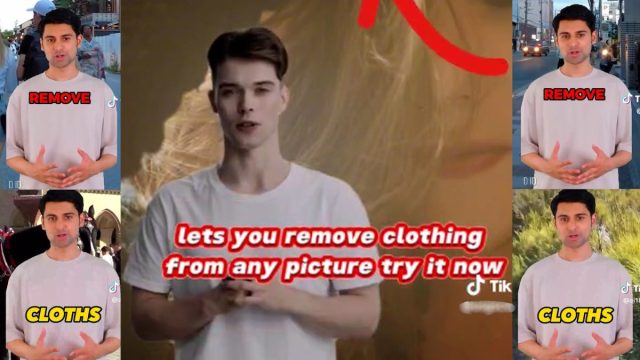It’s straightforward to discover online artificial intelligence tools that can be utilized to generate AI nudity, and occasionally, accounts on social media platforms such as YouTube and TikTok can facilitate this process.
NewsNation identified numerous videos promoting websites that offer the capability to “remove clothes from any picture,” even those of individuals’ “crushes,” through a TikTok search.
In a TikTok video dated September 18, an individual seemingly AI-generated mentioned, “Do you have a photo of your love? Because no woman wants you to know about this resource, I’ve found an incredible AI site that you’ll find intriguing. It can remove clothes from any image.”
NewsNation also reviewed another recent TikTok video of a similar nature, both exhibiting a mechanical rhythm that is strikingly alike.
Following a TikTok search for AI nudity last week, multiple results were yielded, but the search was subsequently blocked by the system the next day. Instead, a message appeared stating, “This word might be associated with actions or content that violate our guidelines.”
Relevant comments were surfaced by the search term, some of which were listed on the phone’s “others searched for sidebar.”
There is growing concern over cyberbullying and artificial intelligence, underscored by a recent incident involving nude images in New Jersey. Allegedly, one or more students at Westfield High School utilized an online application to create AI pornographic images of female classmates, which were then shared in class chats.
A parent of a 14-year-old student expressed apprehension about the potential impact on her daughter’s future, emphasizing the need to address such issues promptly and effectively.
While the availability of online courses and user-friendly programs related to AI is abundant, the specific AI tool used by the students in this case remains unclear as Westfield authorities continue their investigation.
Adam Dodge, an attorney advocating against technology-enabled abuse through his company EndTAB, highlighted the existence of a comprehensive ecosystem supporting such activities.
Artificial “nudifier” applications leverage deep learning algorithms and other AI tools to manipulate real images into nude ones, often trained on female images to overlay realistic naked body parts even when the subject is clothed.
Despite the prevalence of these tools, accounts on TikTok and YouTube, popular social media platforms among American teenagers, were found to be promoting them.
On TikTok, numerous videos seemingly produced by websites utilizing AI to undress individuals in images can be found. A compilation of some of these videos is presented in a hybrid format.
Upon contact via email, TikTok removed two flagged clips, citing its policy on AI-generated content, which mandates transparent disclosure of manipulated media.
The company spokesperson emphasized TikTok’s policies against sexual abuse, prohibiting users from altering another person’s image to sexualize them.
Meta has announced plans to label social ads featuring AI-generated visuals to aid citizens by 2024.
Google-owned YouTube has seen videos demonstrating the creation of “Not Safe for Work (NSFW) AI graphics” garnering hundreds of thousands of views. A sponsored blog promoting an “Artificial clothes remover” surfaced prominently in NewsNation’s search results on the platform.
Google refrained from commenting on whether the sponsored content violated its guidelines against sexually explicit material, raising concerns about the oversight of such content.
Dodge stressed the importance of social media companies taking proactive measures to protect individuals, particularly minors, from such harmful content.
YouTube recently introduced new guidelines requiring video creators to disclose the production of altered or synthetic content. Similar to TikTok, Google employs a combination of AI technologies and human moderators to enforce community standards.
These efforts come amidst an evolving AI landscape, where discerning between authentic and fabricated content has become increasingly challenging.
Incidents like the circulation of AI-generated nude images in a New Jersey school have prompted investigations and raised awareness about online threats.
Dodge, through EndTAB, aims to educate the public about such risks and advocate for safeguards against non-consensual dissemination of photoshopped pornography.
The proliferation of deepfakes, as highlighted by Sensity AI, underscores the need for vigilance and regulatory measures to address the growing threat of manipulated content.
As technology advances, governments are working to update laws to address deepfake-related issues, with some states taking independent action to combat the spread of AI-generated content.
Dodge emphasized the importance of parental guidance in educating children about online risks and promoting safe internet practices to navigate the digital landscape effectively.






